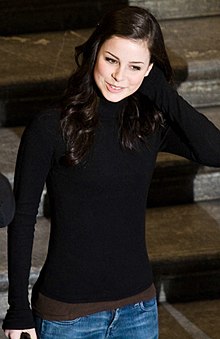">Lena Meyer-Landrut (born 23 May 1991),[1] also known by her stage name Lena, is a German singer. She
represented Germany in the Eurovision
Song Contest 2010 in Oslo, Norway, and won the
contest with the song "Satellite".[2][3] With her three entries from the German national final Unser
Star für
Oslo (Our Star for Oslo), Meyer-Landrut set an all-time chart
record in
her home country by debuting with three songs in the top five of the German singles
chart.[4] "Satellite" debuted at number
one in Germany, and
has been certified triple
gold since.[5][6]My
Cassette
Player, which debuted at number one in the German albums chart.[7] In May 2010, Meyer-Landrut released her first album,
| Lena Meyer-Landrut | |
|---|---|
 Lena Meyer-Landrut in Hannover, March 2010 | |
| Background information | |
| Also known as | Lena |
| Born | 23 May 1991 |
| Origin | Hanover, Germany |
| Genres | Pop |
| Occupations | Singer |
| Years active | 2010–present |
| Labels | USFO, Universal Music Germany |
| Website | www.lena-meyer-landrut.com  The modern logo was introduced for the 2004 Contest to create a consistent visual identity. The host country's flag appears in the heart. The Eurovision Song Contest (French: Concours Eurovision de la Chanson)[1] is an annual competition held among active member countries of the European Broadcasting Union (EBU). Each member country submits a song to be performed on live television and then casts votes for the other countries' songs to determine the most popular song in the competition. Each country participates via one of their national EBU-member television stations, whose task it is to select a singer and a song to represent their country in the international competition. The Contest has been broadcast every year since its inauguration in 1956 and is one of the longest-running television programmes in the world. It is also one of the most-watched non-sporting events in the world,[2] with audience figures having been quoted in recent years as anything between 100 million and 600 million internationally.[3][4][5][6][7] Since 2000, the Contest has also been broadcast over the Internet,[8] with more than 74,000 people in almost 140 countries having watched the 2006 edition online. Eurovision has also been broadcast outside Europe to such places as Argentina, Australia, Brazil, Canada, Chile, China, Egypt, India, Japan, Jordan, Mexico, New Zealand, the Philippines, South Korea, Taiwan, Thailand and Uruguay despite the fact that they do not compete.[9] |


